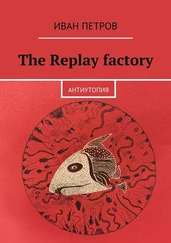Bryce Courtenay - The Potato Factory
Здесь есть возможность читать онлайн «Bryce Courtenay - The Potato Factory» весь текст электронной книги совершенно бесплатно (целиком полную версию без сокращений). В некоторых случаях можно слушать аудио, скачать через торрент в формате fb2 и присутствует краткое содержание. Жанр: Современная проза, на английском языке. Описание произведения, (предисловие) а так же отзывы посетителей доступны на портале библиотеки ЛибКат.
- Название:The Potato Factory
- Автор:
- Жанр:
- Год:неизвестен
- ISBN:нет данных
- Рейтинг книги:3 / 5. Голосов: 1
-
Избранное:Добавить в избранное
- Отзывы:
-
Ваша оценка:
- 60
- 1
- 2
- 3
- 4
- 5
The Potato Factory: краткое содержание, описание и аннотация
Предлагаем к чтению аннотацию, описание, краткое содержание или предисловие (зависит от того, что написал сам автор книги «The Potato Factory»). Если вы не нашли необходимую информацию о книге — напишите в комментариях, мы постараемся отыскать её.
The Potato Factory — читать онлайн бесплатно полную книгу (весь текст) целиком
Ниже представлен текст книги, разбитый по страницам. Система сохранения места последней прочитанной страницы, позволяет с удобством читать онлайн бесплатно книгу «The Potato Factory», без необходимости каждый раз заново искать на чём Вы остановились. Поставьте закладку, и сможете в любой момент перейти на страницу, на которой закончили чтение.
Интервал:
Закладка:
Though children are not concerned with colour, their parents soon enough perceived the presence of Hawk and it did not take them long to complain about the black child. Mary was asked by Mrs Tibbett to remove Hawk and Tommo from the school.
It was a fight Mary knew she could not win, and she saw no point in venting her spleen on the hapless Mrs Tibbett, who seemed genuinely distressed that she was forced to make the demand. Besides, Mary felt that the school was holding back her children for the benefit of other children less well prepared.
So she determined that she would continue as she had begun and personally attend to the education of her two children. In this she had elicited Ikey's most reluctant assistance, particularly as she required that he teach them nothing in the way of dishonest practices. Ikey protested that he knew of no other way to teach an urchin, and that if he should be forbidden to teach Tommo and Hawk the gentle art of picking a pocket, or show them how to palm a card or otherwise cheat at cribbage, pick a simple lock, short change a customer, successfully enter a house though it be securely locked, or doctor a stolen watch, there was nothing contained in his lexicon of knowledge which he believed could be useful to them.
'You will teach them of human nature! They must grow up able to read a man or woman the way you do. How they stand or use their hands or smile or protest, how to know the fool from the villain and the good from the bad. Who to trust and who should be avoided. The manner o' the confidence man and the language o' the cheat and the liar. That is what I want them to know, Ikey Solomon!'
Ikey laughed. 'They are not Jews, my dear, they are not the raw material it has taken a thousand years and more to breed, so that this kind of wisdom is ingested without the need to think.'
'You must teach them, Ikey. Hawk most of all, for I fear greatly for him in this world where the dark people suffer even though they commit no crime, where the lowest wretch thinks himself superior to a black skin. You must teach Hawk to be a good reader of human nature.'
Ikey soon discovered that children with full bellies who are surrounded by love and attention make poor observers of human nature. Children learn the lessons in life by being thrown into life, and so he decided to take Hawk and Tommo to the races each Saturday. But first he taught them a new language. He found that both boys enjoyed the finger and hand actions which comprise the ancient silent language used among the traders in Petticoat Lane, Rosemary Lane, Whitechapel, Covent Garden and the other London markets. It is said that it is a language used by the Jews since the fall of the great temple of Solomon. That the Jews brought it to England in the Middle Ages and it became a language used in English prisons and had been brought to Port Arthur, where prisoners were not permitted to talk to each other. It was also most useful at the race track, where bookmakers talked to each other, setting the odds and laying of bets across the paddocks, and there it was commonly known as tic-tac.
Tommo and Hawk, like all young children, quickly learned the rudiments of this language and it did not take long before they added some of their own unique signs and devices, which meant they could silently communicate to each other on any subject.
Ikey was delighted with their progress, and when they were seven he would take them to the races, where they would move from one on-course bookmaker to the other sending back the odds to Ikey so that he was seldom caught short or 'holding the bundle' as it is known in racing parlance. In exposing them to the myriad people to be found at the Hobart races he was able to begin teaching Tommo and Hawk the lessons Mary wanted them to learn. Ikey taught them how to look at a crowd and break it into its various components.
'If you knows what you're looking for in a crowd, my dear, then you can read it like a book.' He looked down at Hawk. 'A crowd be composed o' what, Mr Dark Thought?'
Hawk looked at Ikey with his big serious eyes. 'Folks?'
'Folks! That be a right and splendid answer, very clever indeed!'
'What sort o' folks, Mr After Thought?' he asked Tommo.
'Very ugly ones what stinks!' Tommo replied, waiting for the giggle to come from Hawk.
'Well, well, well and we are the pretty ones what smells perfect are we then?' Ikey said. 'I stinks meself and I am not very pretty I admits. So be the crowd all like me? Like Ikey Solomon?'
'All sorts of different folks,' Hawk replied for Tommo.
'Yes! With all sorts o' different needs and deeds,' Ikey replied. 'Needs and deeds, that be what you have to learn, my dears. If you knows what folks needs, you can begin to understand their deeds.'
Ikey would patiently teach them how to spot the pickpocket, and to listen to the chatter of a tout, to notice the gestures and the patterns of speech of the confidence trickster, how to know when a man was a liar or a cheat. How body language was almost always the first way to judge a man.
'Then, when you've seen how he stands or sits or walks or uses his hands and his head, and he fits into a pattern, then, when you talks with him you listens with your stomachs, my dears.'
'Your stomach!' Tommo laughed. 'Be me belly button me new ear then?'
'That be most clever of you, Mister After Thought, most clever and to be remembered. "Let your belly button be your most important ear!" '
'Have you got a very big belly button then, Ikey?' Hawk asked. 'Big as your ear?'
'Huge, my dear!' Ikey slapped his pot belly. 'Nearly all be ear what's constantly listening.'
The two boys found this very funny. 'So what does you do with your ears on your head?' Hawk asked.
'Now that be another most clever question, Mister Dark Thought.' Ikey pulled at both his ears. 'These be your listening eyes.'
'Eyes can't listen!' both the boys shouted.
'Oh yes they can! If they be ears!' Ikey said solemnly.
'But ears can't see,' Hawk said emphatically.
'Oh yes they can! If they be eyes! Ears what is eyes and eyes what is ears is most important in the discovery o' human nature!'
'How?' they both chorused.
'Well, human speech be like pictures, only word pictures. When we speaks we paints a word picture what we wants others to see, but we only paints a part o' the picture what's in our heads. The other part, usually the most important part, we leaves behind, because it be the truth, the true picture. So your ears have to have eyes, so they can see how much o' the real picture what be in the head be contained in the words!'
'How then are eyes become ears?' Hawk asked.
'Well that be more complicated, but the way we moves our hands and heads, and folds our arms or opens them up, scratches our nose or puts our fingers over our lips, tugs our ear, twiddles our thumbs or fidgets, or puts one foot on the instep o' the other like Tommo be doing right now, that be what you calls the language o' the body. If you listen to the language o' the body with your eyes and sees the picture in the mind with your ears, you begins to get the drift o' the person, that is if you listens…'
'Through the ear in your belly?' Hawk shouted, delighted.
'Bravo! If he don't feel good in your stomach, then always trust it, my dears! Bad stomachs and bad men go well together!'
Tommo appeared to pay less attention to these lessons, but Hawk silently absorbed everything Ikey told him. Unlike his previous pupils in the Academy of Light Fingers, neither Tommo nor Hawk suffered from hunger and cold, homelessness or a lack of love. Privileged children only embrace the more difficult lessons in life when their survival is threatened and then it is often too late.
Both Mary's boys showed an early proficiency in numbers and constantly used the abacus, but once again it was Hawk who most quickly mastered the mysteries of calculation. By the time Ikey took them to the Saturday races Hawk carried his own small abacus and could calculate the odds in an instant and send them by sign language to his brother. Tommo would stand well outside the betting ring but where Ikey could glance up at him while he worked, and as he began to prosper as a bookmaker he came to rely increasingly on the two boys.
Читать дальшеИнтервал:
Закладка:
Похожие книги на «The Potato Factory»
Представляем Вашему вниманию похожие книги на «The Potato Factory» списком для выбора. Мы отобрали схожую по названию и смыслу литературу в надежде предоставить читателям больше вариантов отыскать новые, интересные, ещё непрочитанные произведения.
Обсуждение, отзывы о книге «The Potato Factory» и просто собственные мнения читателей. Оставьте ваши комментарии, напишите, что Вы думаете о произведении, его смысле или главных героях. Укажите что конкретно понравилось, а что нет, и почему Вы так считаете.












